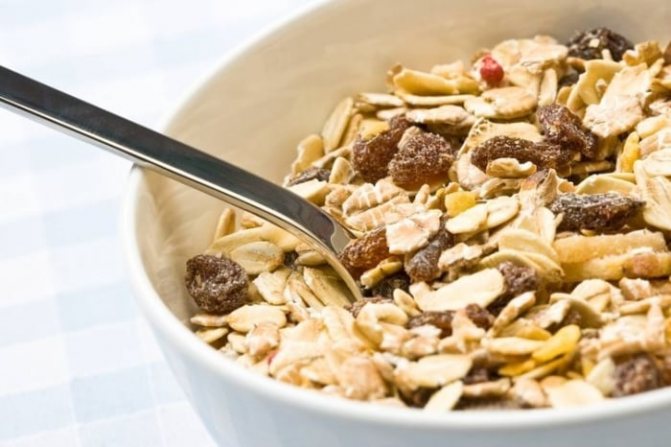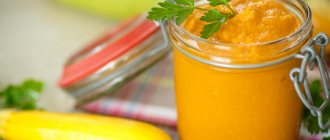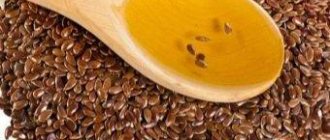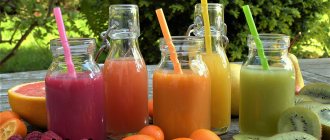The diet of a nursing woman is divided into several important stages. Over the course of 3 months, the functioning of the newborn’s digestive system, as well as the process of producing digestive enzymes necessary for the breakdown of breast milk, takes place. During the first 3 months of life, the main food for a newborn is mother’s milk, so at this stage there are special requirements for the components of the mother’s diet.
The consumption of certain foods causes the development of digestive disorders in the baby, the appearance of intestinal colic and the formation of intestinal dysbiosis.
During lactation, a woman is strictly prohibited from consuming the following products:
- fruits from the citrus family;
- products containing cocoa powder (chocolate);
- bell and hot peppers, garlic, onions, celery;
- legumes;
- spices, rye bread, carbonated drinks, grapes, black tea and coffee;
- alcoholic drinks, including beer.
All these products can cause indigestion and increased gas formation in the baby’s intestines.

The list of recommended products includes:
- boiled and stewed vegetables;
- cereals, cereals and muesli;
- foods rich in animal protein (cottage cheese, meat, fish);
- fresh herbs and fruits (except citrus fruits);
- fresh berries (blueberries, gooseberries, black currants).
Composition and benefits of cream
Cream is very nutritious and rich in nutrients. They contain the following vitamins A, E, C, PP, group B. Also microelements:
- magnesium;
- iron;
- calcium;
- phosphorus;
- chlorine;
- zinc;
- potassium.
These substances help proper growth and development, good vision, have a beneficial effect on the condition of the skin, develop immunity, play an important role in metabolism (of fats, proteins and carbohydrates), and in the construction of the musculoskeletal skeleton. It also ensures the proper functioning of the heart, liver, digestive and nervous systems, and thyroid gland.
In addition, the cream contains a rare but very useful substance - lecithin. It prevents liver disease and prevents the deposition of cholesterol on the walls of the vessel. L-tryptophan included in the composition helps fight stressful situations, depression and nervous disorders, that is, it has a beneficial effect on the nervous system.
Cream also has a diuretic effect, which helps fight swelling. And in case of poisoning and some diseases of the gastrointestinal tract, doctors strongly recommend drinking cream. Tea with cream will give a young mother a calm and deep sleep.
Harm and contraindications
Contraindications for use are excess weight, since this product is quite high in calories. Also, if you have heart disease, it is not recommended to use them. If the fat content of cream is more than 10%, there is an excessive load on the pancreas, so if you have diseases of this organ, you should not include it in your diet.
Previously, milk and products made from it were simply necessary in the menu of a nursing mother. But now it is quite common to experience intolerance to cow protein or an allergy to it.
In this case, cream is prohibited during breastfeeding. Especially in the first month of a newborn and with existing heredity, that is, if close relatives or parents had a negative reaction to the cream.
Is it possible to eat sausage cheese during breastfeeding - Mom's news
There is no arguing about the need to consume fermented milk products, especially if this concerns women during lactation.
But many mothers are interested in the question of whether sausage cheese can be consumed while breastfeeding, because it also belongs to this category of products. Opinions differ on this matter, so it is worth understanding this dilemma in more detail in order to avoid unpleasant consequences.
Today, in terms of the number of fermented milk products consumed, cheese takes an honorable first place for many. And this is not surprising, because the wide variety of this product and its amazing taste characteristics deserve respect.
Both regular processed cheese and exotic blue cheese are available for sale. But the sausage, familiar to us from childhood, also has its supporters. This is all thanks to its wonderful aroma and relatively inexpensive cost.
Sausage cheese production process
Unfortunately, not all manufacturers are conscientious, and as a result, many products fall far short of quality standards. First of all, this is due to the content of a large number of artificial ingredients.
To make sausage cheese, cheeses that have expired are often used. Next add cottage cheese, cream and butter. Melting salts are then added to obtain the correct consistency, which prevents the cheese from hardening prematurely.
Also, the product must contain seasonings and spices, because they give it a unique aroma and amazing taste. For lovers of smoked flavor, manufacturers make sausage cheese with the addition of liquid smoke.
According to all quality standards, this product should contain only the above ingredients, but unscrupulous manufacturers often use:
- artificial colors,
- flavorings,
- vegetable fats,
- Palm oil.
The use of such additives threatens serious health problems, which can become chronic.
What are the benefits of sausage cheese?
By consuming a high-quality product, you can not only enjoy delicious cheese, but also enrich your body with useful substances. Its main advantages include the fact that it is absorbed faster than hard varieties and contains a minimal amount of cholesterol.
Sausage is also rich in vitamins: A, B, D, PP. And it also contains:
- iron,
- zinc
- folic acid.
Sausage cheese on the nursing menu
It is worth noting that with the systematic consumption of good, natural cheese, the body is fully saturated with organic acids, lipids and proteins. Sausage cheese, made only from natural ingredients, can be consumed by a woman while breastfeeding, because it promotes:
- Improving immunity;
- Strengthening bones;
- Healthy hair shine;
- Normalization of acid-base balance;
- Improving the functioning of the cardiovascular system.
But, despite all the beneficial properties, this product is eaten in moderation, as it contains a large amount of salt.
When answering the question whether sausage cheese can be consumed while breastfeeding, it is important to say only one thing: a nursing mother should eat it with great caution, and it is better to wait as long as possible with it. Ideally, until the baby grows up and starts eating something other than mother’s milk.
Unfortunately, due to the lack of information about the conditions under which and from what components it was made, sausage cheese can seriously harm the baby.
At a minimum, he may have an intestinal upset or an allergy to some ingredient in the cheese. Therefore, for the sake of the baby’s health, it is better for mom to refuse such a dubious product during the feeding period.
mama-news.ru
Cream for lactation
Like most dairy products, cream enhances lactation, stimulates milk flow and increases its fat content. Therefore, in this regard they are very useful.
Also included in the composition, calcium helps the proper formation of the baby’s bone skeleton. And phosphorus, in cooperation with it, prevents the mother’s teeth and their enamel from deteriorating.

They promote calm, which is especially necessary for postpartum depression. If you drink cream with herbal teas (mint, lemon balm, anise, cumin), their effect increases.
To recover after childbirth, tea with cream and a teaspoon of honey will help. And not only for lactation, but also for well-being and replenishment of nutrients in the body.
Vitamin D, which is also included, helps in the prevention and treatment of rickets.
In what cases is cream allowed for breastfeeding:
- if a woman is thin or of normal build, that is, she is not overweight;
- the milk is not particularly fatty, and the child is underweight;
- with anemia, general weakness;
- with a lack of nutrients and nutrients;
- in the absence of allergies and intolerances.
List of products for a nursing mother
The birth of a child completely changes the life of its parents. Especially for mom - she doesn’t even have a free minute: washing, walking, feeding, bathing, etc. The diet also completely changes - this is very important for a nursing woman. After all, she is breastfeeding, and everything she eats will be felt by the baby, and he only needs useful and nutritious microelements. The list of products for nursing mothers, of course, is small and you will have to use your imagination to prepare different dishes. It is also important that in infancy, the child is very sensitive to food, and it is necessary to monitor that the food that the mother eats does not cause diathesis, colic or allergies.
We hope that based on it, it will be much easier for a woman to come up with varied and nutritious breakfasts, lunches and dinners according to her taste and the child’s reaction to foods.
Recommended product list:
- Meat: beef, veal, rabbit, turkey, chicken (and eggs).
- Low-fat fish: cod, hake, pike perch, carp.
- Cereals: buckwheat, oatmeal, wheat, rice.
- Oil: butter, olive, vegetable.
- You can eat any bread, but preferable is with bran, and if white, then slightly dried or, more simply, “yesterday’s bread.”
- Fermented milk products: yogurt (without additives and fruit), low-fat cottage cheese, kefir, fermented baked milk, cream.
- Vegetables and fruits should be chosen according to the season and from those that tend to grow in your area.
- Dried fruits: figs, dried apricots, prunes.
- Nuts: walnuts and pine.
- Spices and herbs: thyme, savory, lemon balm, mint, dill, green onions, parsley, bay leaf, rose hips, basil.
- Cookies and sweets. During this period, you can only eat dry cookies without additives: crackers, bagels, crackers. For sweets, you can only have sweet tea with sugar, condensed milk, white ice cream made from natural ingredients and also without additives.
- Seeds.
- Drinks: green, herbal or weak black tea with milk without additives, non-carbonated water, lingonberry or cranberry juice.
This list of allowed foods should still be consumed by a nursing mother with caution and in moderation, since the baby may experience: allergic reactions, colic, constipation, indigestion, diarrhea, rashes and other negative reactions of the body to new foods.
Many experienced mothers recommend keeping a food diary in which you can record all the foods and the baby’s reaction to them. Then it will be easier to exclude from the list of products for nursing mothers an undesirable ingredient to which the child’s body reacts negatively.
List of prohibited foods for nursing mothers
Of course, there are a great many products that are strictly prohibited for nursing mothers. These include:
- Alcohol
- Unfamiliar or exotic food, citrus fruits.
- All types of Fast food cuisine.
- Products containing artificial additives, thickeners, dyes, preservatives, sweeteners, flavor or aroma enhancers, etc.
- Coffee, strong brewed tea.
- Fatty and fried foods.
- Bean products.
- Dried, smoked, dried meat and fish.
Colic in babies
To prevent a child from having colic, it is necessary to exclude or minimize the intake of gas-forming foods. If the nutrition of a nursing mother and the list of products are selected correctly, and colic continues, then you need to pay attention to your health. Perhaps the mother’s body lacks some enzymes to completely digest or break down food, hence the child, of course, will have problems absorbing mother’s milk.
Related articles:
| Can a nursing mother have coffee? Sleepless nights, sleepy mornings... How to wake yourself up when you so want to sleep after a “fun” night arranged by your beloved child? Previously, coffee could have saved the waking situation, but now that you are breastfeeding your baby... Is it okay for nursing mothers? | Can a nursing mother eat tomatoes? Almost every dish on our tables cannot be done without tomatoes. Especially in the summer and autumn, when they are the most delicious, healthy, and also inexpensive! But the tomato has bright red pigmentation, and therefore the possibility of its inclusion in the menu of a nursing woman is questionable. Let's look into this issue! |
| A woman’s diet during breastfeeding undergoes strict adjustments, especially if the baby is allergic. What foods should a nursing mother's diet consist of and what foods should she avoid? This will be discussed in our article. | Can a nursing mother eat chicory? Chicory is a great alternative to coffee. Many nursing mothers make their choice in favor of this drink, because... it does not contain caffeine, and besides, it is unusually healthy. At first glance, there are some advantages, but is this really so? What properties does this drink contain? And is it really that useful for breastfeeding women? |
WomanAdvice.ru
How to introduce it into the diet
When breastfeeding, any product must be introduced gradually to identify allergies, intolerances or unpleasant effects on digestion. To avoid problems and make them easier to notice (and survive), the most important thing is to try the cream in the morning. It is best to add them to tea, about 1-2 teaspoons. The reaction may take up to 12 hours to manifest itself. During this time it is necessary to monitor the baby.
If you notice rashes, redness or itching, it is better to avoid using this product next time.
The same should be done if the baby is worried, presses his legs to his tummy, and screams strainedly. This means that this product is now too heavy for the child, but does not mean that it should be forgotten. Introduction to the diet should be postponed for 2-4 weeks.
Even if the baby does not have a negative reaction, you should not use more than 100-120 ml of cream in food. This can have a detrimental effect on the functioning of the liver and pancreas. Fat content should be no more than 10-15%. In this case, consumption will only bring you pleasure.
Recommendations
Despite the listed negative phenomena, cream in the amount of 10-20 ml per day is recommended for nursing women:
- With insufficient body weight.
- With asthenia.
- With low hemoglobin.
- In the absence of an allergy to cow's milk protein.
Use only natural cream . They should not contain preservatives or milk fat substitutes. Any harmful component is transmitted through breast milk and has a negative effect on the baby.
How to enter it into the menu correctly?
Provided the mother is in complete health and there are no visible contraindications, you can add 1 teaspoon to weak tea or water from the first week.
In order not to cause harm to the baby, the product should be introduced gradually in the morning after feeding , so that during the day the baby’s possible reaction to cow’s milk protein can be monitored.
If within 24 hours you notice that the baby turns red, cries often, or irritation appears on the skin, you should temporarily forget about the cream.
In order not to make a mistake with the product that caused such a reaction in the baby, you need to introduce 1 new product every other day, which will eliminate the unreliability of the experiment.
Cream for a young mother can be consumed with any drinks , added to sauces, meat or fish, vegetable and fruit purees.
Attention! It is necessary to observe the daily intake of milk treats (no more than 30 ml per day).











